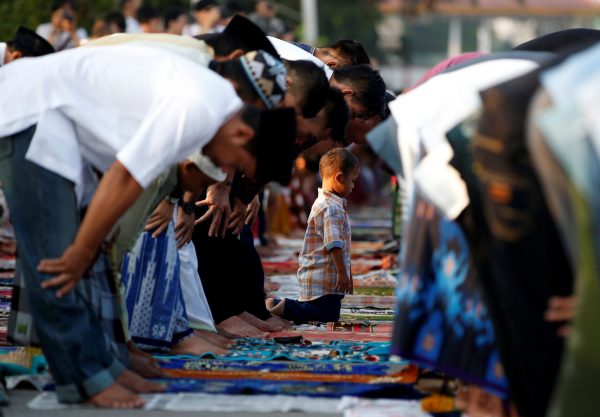Participants held overwhelmingly negative views of Indonesian Islam, associating it with terrorism and the Middle East.
If it is true that relations between Australia and Indonesia are defined by differences rather than commonalities, as many scholars have asserted, then religion is one of the biggest points of contrast between the two countries. There are about 220 million Indonesian Muslims (88 per cent of the total population) compared to just 476,000 Australian Muslims (2.2 per cent).
For most of the history of bilateral relations, Islam has, somewhat strangely, figured little in Australian diplomacy towards Indonesia. Only with the rise of terrorism in the early 2000s, and especially the October 2002 Bali bombing that cost 88 Australian lives, did Islam become a prominent element in the relationship.
Prior to the emergence of terrorism 15 years ago, Australian political leaders had only generalised views of Indonesian Islam as moderate and tolerant compared to the more severe forms of the faith found in the Middle East. But once the Indonesian bombings began, this perception of moderation became overlaid with fears that radicalism from other parts of the Muslim world had ‘infected’ Indonesia’s once benign expression of Islam.
There were two main Australian government responses to this. The first involved the crafting of a diplomatic narrative that extolled Indonesia’s Islamic tolerance, seeking to turn the terrorism problem into a diplomatic positive. The second resulted in a massive expansion in Islamic sector aid to Indonesia, which was sold primarily as countering terrorism but actually had much wider educational and democratic objectives.
The Howard government wrote the script for characterising Indonesian Islam and every subsequent government has largely followed this. To begin with, it drew a sharp distinction between moderate and radical Islam, casting the former as the essence of Islam and the latter as an evil perversion of the faith’s true teachings. Both ordinary Indonesians and Australians were said to be victims of extremism with a shared interest in fighting it, thus emphasising a common struggle between the two nations against terrorism.
After the tensions arising from Australia’s East Timor intervention, counter-terrorism efforts allowed a dramatic resetting of relations, ushering in unprecedented security cooperation between Australian and Indonesian police and intelligence agencies.
Australian governments became advocates in international fora of ‘Indonesia’s moderate democratic Islam’, telling other Western nations that Indonesia could serve as a beacon to the rest of the Muslim world in fighting radicalism. This line was particularly common during the presidency of Susilo Bambang Yudhoyono from 2004–2014. Howard rebuked leading Western governments for ignoring Indonesia’s success against extremism. In this way, Australia played the role of Indonesia’s champion in diplomatic circles, which met with warm approval from Yudhoyono who saw himself as a global statesman.
But in reality, Australia’s narrative was overdrawn. The dichotomising of Indonesia’s diverse Muslim community into moderate-radical, good-bad binary opposites was simplistic and showed little awareness of the complexities of religious life. Moreover, Australian politicians and diplomats were inclined to pass summary, unwitting judgement on who was or wasn’t a ‘true’ (meaning ‘moderate’) Muslim. Indonesian Muslim leaders who met government officials grew tired of their relentless emphasis on radicalism and lack of interest in almost any other aspect of their faith. Last of all, Indonesia had, regrettably, little influence in the rest of the Muslim world, and Australia’s efforts to promote its neighbour were largely futile.
The second major initiative was to give development assistance to the Islamic education sector. Prior to the Bali bombing, Australian aid to Islamic schools and universities was a minor part of the aid program — less than AU$1 million (US$766,000) per annum. But between 2004 and 2016, more than AU$167 million (US$128 million) was disbursed into Islamic sector assistance.
The main initiator of this assistance was then foreign minister Alexander Downer, who justified the leap in expenditure as a counter-terrorism measure. He argued that vulnerable Muslim students were drawn to radical Islamic schools because they could not afford better quality ‘moderate’ education. There is little evidence to support this assertion, but the funding was gratefully received by an Islamic education sector that lagged far behind the standard of non-religious state schools and non-Muslim private schools.
Since 2016, Islamic education support has dwindled to a trickle and most ‘Islamic’ development assistance is channelled directly towards counter-terrorism projects within larger programs such as the Australia–Indonesia Partnership for Justice.
Although much of Australia’s Islamic sector aid program was driven overtly by security concerns, it nonetheless succeeded in improving educational standards and created immense goodwill towards Australia within the Muslim community. Its curtailment has prevented Australia from gaining longer term benefits from 12 years of generous development assistance.
Sadly, Australian views of Indonesian Islam continue to be excessively shaped by apprehension and security preoccupations, which in turn generate reductionist moderate–radical typologies. Threat perceptions make a hollow basis for bilateral relations.
Australia’s Islamic sector assistance from 2004–2016 show the possibilities for more positive engagement with Indonesia’s vast Muslim community. As Indonesia’s Muslims become more conservative and Islamic values more salient in national life, Australia should be interacting more, not less, with the Islamic sector, and should lift its gaze beyond narrow counter-terrorism concerns when deciding where its priorities lay.
Greg Fealy is Associate Professor of Indonesian Politics in the Department of Political and Social Change, College of Asia and the Pacific, The Australian National University. This article is based on a chapter from a forthcoming book entitled Strangers Next Door: Australia and Indonesia in the Asian Century, edited by Tim Lindsey and Dave McRae.

